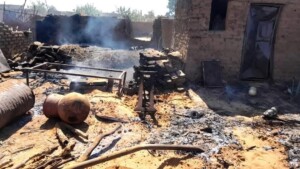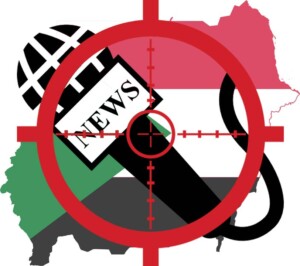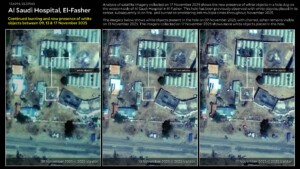Sudan report: ‘Nearly 500 North Darfur villages destroyed during the war’
The war in Darfur has led to the destruction of 476 villages in North Darfur. People from Kutum staged a protest in Khartoum. Large numbers of paramilitary Rapid Support Forces have been deployed in Central Darfur.
The director of the Darfur Commission for Voluntary Return and Resettlement, El Sadig Dosa reported in a workshop in El Fasher, capital of North Darfur, yesterday that the war that broke out in Darfur in early 2003 has led to the destruction of 476 villages in the state.
 A displaced girl sits on a bed next to the remnants of her burnt house in Khor Abeche, South Darfur, April 2014 (Albert González Farran / UNAMID)
A displaced girl sits on a bed next to the remnants of her burnt house in Khor Abeche, South Darfur, April 2014 (Albert González Farran / UNAMID)
The war in Darfur has led to the destruction of 476 villages in North Darfur. People from Kutum staged a protest in Khartoum. Large numbers of paramilitary Rapid Support Forces have been deployed in Central Darfur.
The director of the Darfur Commission for Voluntary Return and Resettlement, El Sadig Dosa reported in a workshop in El Fasher, capital of North Darfur, yesterday that the war that broke out in Darfur in early 2003 has led to the destruction of 476 villages in the state.
In the workshop Strategic Partnership for the Safety of Returning Displace People and Refugees, Dosa called on all humanitarian aid partners present to exert their utmost efforts to help with the reconstruction of the houses and the provision of basic services in the villages.
In addition, well-equipped police stations are to be established in the areas of voluntary return in order to provide security and safeguard sustainable development.
The workshop was attended by North Darfur Native Administration leaders, representatives of the displaced people and refugees, members of the Forces for Freedom and Change and the Resistance Committees active in the neighbourhoods and villages in the state, as well as United Nations agencies and organisations working in the humanitarian field.
In 2017, the UN reported that nearly one third of Darfur’s population, consisting of 9,241 million people, remained displaced. As of the end of 2019there were 2.1 million people living in displacement in the country, according to the Internal Displacement Monitoring Centre (IDMC). “Ongoing violence, particularly in Darfur, and disasters, predominantly flooding, also trigger significant new displacement every year,” the centre stated.
Call for security
People from Kutum living in Khartoum staged a vigil in front of the Council of Ministers yesterday in protest against the continuing attacks by militant herders on villages and farms.
The participants of the vigil chanted slogans calling for security, justice, protection of the farms and orchards during the agricultural seasons, the restoration of the Rule of Law, and disarmament of the militiamen roaming Kutum locality.
They submitted a memorandum to the Prime Minister and another to the Attorney General, calling on them to “urgently intervene and stop the violence in the area”.
The protestors also objected to the interpretation of the attack on the Fata Borno sit-in by the new governor of North Darfur, Mohamed Arabi, who described it as “a conflict between two parties”.
On July 13, the sit-in at the Fata Borno camp for the displaced, south-west of Kutum town, was attacked by “a group of militiamen riding on camels and horses”. At least nine people were killed, and 17 others were wounded during the raid. The attackers torched a number of houses and the camp market, after plundering the place.
The Kutum activists in Khartoum demanded the arrest of the attackers. Many of them were recognised by the camp residents who filed official complaints against them.
They also demandd compensation for the losses that occurred when herders drove their livestock into the farms. The government should bridge the food gap in North Darfur as well.
Rapid Support Forces
The rampant insecurity in Central Darfur is to be quelled by the deployment of a large Rapid Support Forces (RSF) militia* force.
State Governor Adeeb Abdelrahman said in a press statement in Zalingei yesterday that the RSF force “will work to maintain security, secure the agricultural season, and implement the disarmament campaign”.
The governor said the paramilitary forces were sent after he discussed the recurrent attacks on farms and villagers in the area with Sovereign Council member Mohamed El Taayshi and Sovereign Council Deputy President and RSF Commander Mohamed Hamdan ‘Hemeti’.
The governor said that the Central Darfur government is at the same time working to activate the committees that should promote peaceful coexistence and settle disputes between the various communities in the state in order to achieve social peace.
According to investigations earlier this year, Sudan’s largest paramilitary force carried out nearly 100 attacks against towns, farms, and civilians in North Darfur and Jebel Marra since 2016. A number of these villages have been destroyed and have turned into ghost towns after residents fled the area, satellite images from before and after the attacks show.
* Officially, the RSF militia, set up by the ousted Al Bashir regime in 2013, was integrated into the Sudan Armed Forces in August last year. At the same time however, the militia stays a force unto itself. The RSF, which grew out of the Janjaweed who fought for the Sudanese government in Darfur, is widely believed to be responsible for atrocities in the country in the past seven years. Many Sudanese hold the paramilitaries also accountable for the violent break-up of the Khartoum sit-in in June 3 last year.
Radio Dabanga’s editorial independence means that we can continue to provide factual updates about political developments to Sudanese and international actors, educate people about how to avoid outbreaks of infectious diseases, and provide a window to the world for those in all corners of Sudan. Support Radio Dabanga for as little as €2.50, the equivalent of a cup of coffee.












 and then
and then